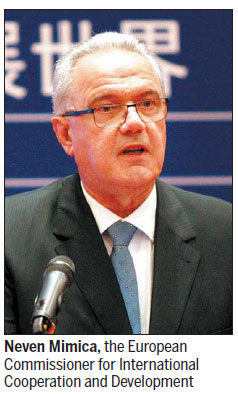Seeds of sustainability need more watering

The European Union is keen to strengthen its collaboration with China in dealing with global issues, particularly in achieving sustainable development, says Neven Mimica, the European Commissioner for International Cooperation and Development.
Mimica says the seeds of that new partnership have already been sown, and the two can now learn more about each other's development policies and better coordinate them.
"We are moving from the donor-recipient relationship we used to have, because China was a developing country," Mimica said while attending the China-Europe High Level Cultural Forum in Beijing at the end of last month.
"This is still a work in progress, but it is now closer to being a donor-donor relationship."
With his visit, Croatian-born Mimica became the first member of the recently installed European Commission to visit China.
China has reached or even exceeded its millennium development goals, he says.
"You accounted for 80 percent of global poverty reduction between 1990 and 2008. You have managed to feed 22 percent of the world's population from only 9 percent of the world's arable land and 6 percent of the world's fresh water, and you have brought down maternal and child mortality rates," Mimica says.

China's sustainable economic growth is the main reason for the progress in reducing poverty, by increasing incomes - in particular for low-income groups in both rural and urban areas - strengthening social welfare, and improving the economic environment.
"China is very active in South-South cooperation. We value this very much as a complement to North-South cooperation. This is what we should see continue by sharing our common responsibility for all the peoples of the world to be free of poverty and not to be deprived of their individual and collective dignity.
"China is an emerging international donor, and it and the EU share the same principles and agenda on how the international development framework should look with sustainable goals. We don't expect each country to contribute the same, financially or in other ways, but we think there should be a balance between this universal and differentiated approach."
There are also global challenges to which every participant has a duty to respond, he says.
Mimica says the world has changed hugely in recent years in many ways, including emerging economies performing extremely well, more and more people joining the middle class, more and more moving from country to city, and many new forms of development and collaboration taking form. In addition, trade has expanded, financial markets have been integrated, and there have been dramatic advances in communications and transport, making the world more connected, even as its constituent parts become more independent.
However, many challenges remain because inequalities within countries are growing, economic and financial crises are reoccurring and natural resources are declining, putting food and other security at risk, he says. The impact of climate change is also a serious issue.
"Today, 700 million people have no access to safe drinking water, 1.2 billion people still live in extreme poverty and 1.5 billion people live in countries affected by violent conflict. So our cooperation with China on development issues is changing and becoming more global.
"A true response is therefore needed to address these global challenges, deliver inclusive, equitable and sustainable human development and preserve global public goods. And such a response must be based on more than economic growth alone. It means social and environmental policies, too ... We need to work in partnership," Mimica says.
Like China, the EU has taken a strong partnership lead in Africa, he says. In 2012, 43 percent of the development assistance EU institutions and member states provided, 20.7 billion euros ($25.77 billion), went to Africa. It would make sense to better coordinate both parties' strategies in Africa, he says.
"Likewise, the EU could work closely with China in Asia, where we strongly support regional cooperation and integration. We want to encourage infrastructure investment in this region, and more coordination between development actors like banks and governments."
Europe may think that there are problems with China's assistance to Africa, he says.
"These misperceptions belong to the past, and we need to work with China in a spirit of mutual respect in developing policies and in all other areas of communication."
chenyingqun@chinadaily.com.cn
(China Daily European Weekly 12/12/2014 page25)
Today's Top News
- Japan tempting fate if it interferes in the situation of Taiwan Strait
- Stable trade ties benefit China, US
- Experts advocate increasing scope of BRI to include soft power sectors
- New engine powers cargo drone expansion
- China to boost green industry cooperation
- Manufacturing PMI rises in November






























